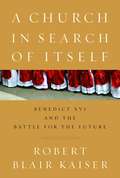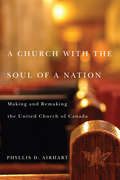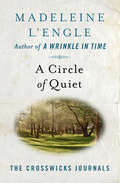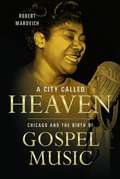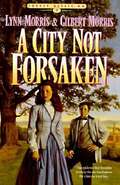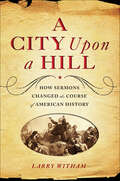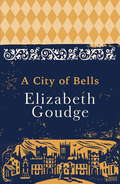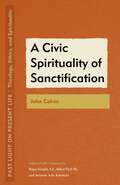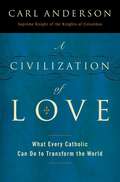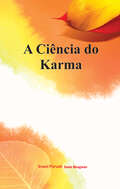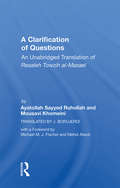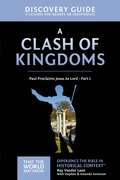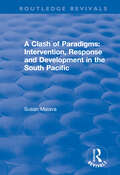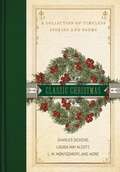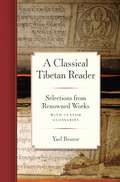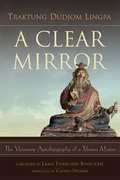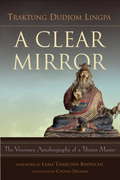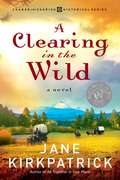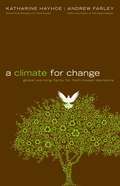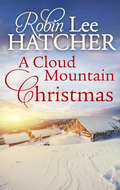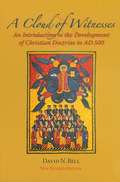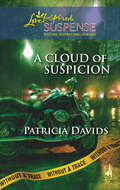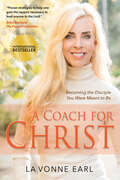- Table View
- List View
A Church in Search of Itself: Benedict XVI and the Battle for the Future
by Robert Blair KaiserA hugely informed look at the intensifying struggle over the future of the Catholic Church. Despite the popularity of John Paul II, opposition to many of his policies had hardened among Catholics by the time of his death. The Church had become more doctrinaire, the voices of millions of dissenters ignored. Now Robert Blair Kaiser examines the most important and divisive issues confronting the Church: the sex abuse scandal, a shortage of priests due to the insistence upon celibacy, the ban on contraception, the roles of women and gays in the Church, the failure to reach out sincerely to other faiths, the increased participation of laypeople in Church affairs. He gives us in-depth portraits of six of the cardinals who gathered in Rome in April 2005 to choose a new pope--Ratzinger from Germany, Mahony from the United States, Murphy-O'Connor from Britain, Rodríguez Maradiaga from Honduras, Arinze from Nigeria, and Darmaatmadja from Indonesia--and through them makes clear why Catholics worldwide are increasingly leaving the Church or defying Church doctrine. Finally, he explains why Ratzinger's ascendance was assured, and what this might mean for the future. With passion and heartfelt concern, Robert Blair Kaiser brilliantly illuminates the issues and the combatants in the battle for the souls of the Catholic world
A Church with the Soul of a Nation
by Phyllis Airhart"As Canadian as the maple leaf" is how one observer summed up the United Church of Canada after its founding in 1925. But was this Canadian-made church flawed in its design, as critics have charged? A Church with the Soul of a Nation explores this question by weaving together the history of the United Church with a provocative analysis of religion and cultural change. The story begins in the aftermath of Confederation, when the prospects of building a Christian nation persuaded a group of Congregationalist, Methodist, and Presbyterian leaders to set aside denominational differences and focus instead on shared beliefs. Phyllis Airhart traces the new church's struggle to save its reputation during a bitter controversy with dissenting Presbyterians who refused to join what they considered a "creedless" church. Surviving the organizational and theological challenges of economic depression and war, the future of the church seemed bright. But the ties between personal faith and civic life that the founders took for granted were soon tattered by the secular cultural storm sweeping through western Christendom. The United Church's remaking came with the realization that creating a Christian social order in Canada was unlikely - perhaps even undesirable - in a pluralistic world. A Church with the Soul of a Nation sheds light on the United Church's past controversies and present dilemmas by showing how its founding vision both laid the groundwork for its accomplishments and complicated its adaptation to the new world taking shape.
A Church with the Soul of a Nation: Making and Remaking the United Church of Canada (McGill-Queen's Studies in the History of Religion #159)
by Phyllis D. Airhart"As Canadian as the maple leaf" is how one observer summed up the United Church of Canada after its founding in 1925. But was this Canadian-made church flawed in its design, as critics have charged? A Church with the Soul of a Nation explores this question by weaving together the history of the United Church with a provocative analysis of religion and cultural change.
A Circle of Quiet: A Circle Of Quiet, The Summer Of The Great-grandmother, The Irrational Season, And Two-part Invention (The Crosswicks Journals #1)
by Madeleine L'EngleThe beloved author of A Wrinkle in Time takes an introspective look at her life and muses on creativity in this memoir, the first of her Crosswicks Journals. Every so often I need OUT. . . . My special place is a small brook in a green glade, a circle of quiet from which there is no visible sign of human beings. . . . I sit there, dangling my legs and looking through the foliage at the sky reflected in the water, and things slowly come back into perspective. Set against the lush backdrop of Crosswicks, her family&’s farmhouse in rural Connecticut, this deeply personal memoir details Madeleine L&’Engle&’s journey to find balance between her career as a Newbery Medal–winning author and her responsibilities as a wife, mother, teacher, and Christian. As she considers the roles that creativity, family, citizenship, and faith play in her life, L&’Engle reveals the complexities behind the author whose works—honored with the National Book Award, the Lewis Carroll Shelf Award, and countless other prizes—have long been cherished by children and adults alike. Written in simple, profound, and often humorous prose, A Circle of Quiet is an insightful woman&’s elegant search for the meaning and purpose of her life. This ebook features an illustrated biography of Madeleine L&’Engle including rare images from the author&’s estate.
A City Called Heaven: Chicago and the Birth of Gospel Music
by Robert M. MarovichIn A City Called Heaven, gospel announcer and music historian Robert Marovich shines a light on the humble origins of a majestic genre and its indispensable bond to the city where it found its voice: Chicago. Marovich follows gospel music from early hymns and camp meetings through the Great Migration that brought it to Chicago. In time, the music grew into the sanctified soundtrack of the city's mainline black Protestant churches. In addition to drawing on print media and ephemera, Marovich mines hours of interviews with nearly fifty artists, ministers, and historians--as well as discussions with relatives and friends of past gospel pioneers--to recover many forgotten singers, musicians, songwriters, and industry leaders. He also examines how a lack of economic opportunity bred an entrepreneurial spirit that fueled gospel music's rise to popularity and opened a gate to social mobility for a number of its practitioners. As Marovich shows, gospel music expressed a yearning for freedom from earthly pains, racial prejudice, and life's hardships. In the end, it proved to be a sound too mighty and too joyous for even church walls to hold.
A City Not Forsaken (Cheney Duvall, M. D. #3)
by Gilbert Morris Lynn MorrisWill Cheney Be Content in the Glittering Lights of High Society? OR NOT Cheney Duvall's attempt to help the mountain folks in the primitive wilderness of the Ozark Mountains had proven to be an extremely difficult experience for both her and her nurse, Shiloh Iron. When they return to her home in New York; Cheney determines to go into a private practice with the handsome Devlin Buchanan, a highly successful physician who had previously asked her to marry him. His sponsorship offered her an excellent chance for success among the most wealthy and refined residents of New York. But dark rumors of plague had reached New York well in advance of the arrival of the ship that was bringing Devlin Buchanan back from London. A cholera outbreak in London had been reported in the early spring of 1866, and the deadly pestilence was now transported on the steamship Virginia. Despite holding the ship in quarantine, New Yorkers knew it was only a matter of time before the disease would spread. Polite Society with its elite circles, glittering stores, finest of clothing, elegant carriages, and lush carpet is a far different world than Cheney has known. And while it's gratifying to brush elbows with the Rockefellers and Vanderbilts, her past work has left its mark deep in her soul. Can Cheney be content in a world of high society and pomp, or will the call of the poor and the horrors of the epidemic draw her back?
A City Upon a Hill: How Sermons Changed the Course of American History
by Larry Witham“Witham’s highly readable history of the American sermon strongly bolsters the contention that words change minds and alter the course of events.” —BooklistPivotal moments in U.S. history are indelibly marked by the sermons of the nation’s greatest orators. From colonial times to the present, the sermon has motivated Americans to fight wars as well as fight for peace. Sermons have provoked the mob mentality of witch hunts and blacklists, but they have also stirred activists in the women’s and civil rights movements. A City Upon a Hill tells the story of these powerful words and how they shaped the destiny of a nation.A City Upon a Hill includes the story of Robert Hunt, the first preacher to brave the dangerous sea voyage to Jamestown; Jonathan Mayhew’s “most seditious sermon ever delivered,” which incited Boston’s Stamp Act riots in 1765; early calls for abolition and “Preacher-Captain” Nat Turner’s bloody slave revolt of 1831; Henry Ward Beecher’s sermon at Fort Sumter on the day of Lincoln’s assassination; tent revivalist/prohibitionist Billy Sunday’s “booze sermon”; the challenging words of Martin Luther King Jr., which inspired the civil rights movement; Billy Graham’s moving speeches as “America’s pastor” and spiritual advisor to multiple U.S. presidents; and Jerry Falwell’s legacy of changing the way America does politics.A City Upon a Hill provides a history of the United States as seen through the lens of the preached words—Protestant, Catholic, and Jewish—that inspired independence, constitutional amendments, and military victories, and also stirred our worst prejudices, selfish materialism, and stubborn divisiveness—all in the name of God.
A City of Bells: The Cathedral Trilogy
by Elizabeth GoudgeReturning injured from the Boer War, Jocelyn Irvin travels to the quiet cathedral town of Torminster. Welcomed there by his young cousin Hugh Anthony, his grandparents and their adopted daughter Henrietta, Jocelyn begins to rediscover his enjoyment of life.As he embraces old friendships and new relationships, Jocelyn becomes captivated by the mystery of writer Gabriel Ferranti, a man whose unexplained disappearance months before has cast a shadow which only his return can lift.A charming story of love, family and laying to rest ghosts of the past.What readers are saying about Elizabeth Goudge'Miss Goudge is a born storyteller' - 5 STARS'I wish I had discovered Elizabeth Goudge a long time ago!' - 5 STARS'One of the greatest storytellers of our time' - 5 STARS'Her writing is unique' - 5 STARS'Elizabeth Goudge is an author par excellence' - 5 STARS
A Civic Spirituality of Sanctification: John Calvin (Past Light on Present Life: Theology, Ethics, and Spirituality)
by John CalvinThis volume presents the spirituality of John Calvin in three short texts drawn from his Institutes of the Christian Religion. Many consider Calvin the most influential thinker of the sixteenth century. His ideas flowed from Geneva into northern Europe, to the English-speaking lands of Britain, and through the Puritans to North America. The prolific writings of Calvin across several genres open up many aspects of Christian living, and each one offers an entrée to his spirituality. On the supposition that “spirituality” refers to the way people or groups lead their lives in relation to ultimacy, three texts have been chosen to form the axis for this interpretation of Calvin’s contribution. These texts deal with his theological view of law, a definition of sanctification, and a short treatise on the Christian life. The portrait of Calvin’s spirituality that emerges from these texts and the larger framework of his theology, his ecclesiology, and his career as church leader and civic organizer can be summarized in the following phrase: a practical spirituality of sanctification by participation in society. One cannot find all of that in these texts, but they establish a platform on which the pieces fall into place. The story of his early life and formation, along with several key ideas that characterize the man and his vision, will help to draw a sharper, more distinctive picture of at least this influential aspect of Calvin’s spirituality. It is one that bears direct relevance, with appropriate adjustments, to life today.
A Civilization of Love: What Every Catholic Can Do to Transform the World
by Carl AndersonCarl Anderson, Supreme Knight of the Knights of Columbus, surveys the exciting and history-changing ideas of Pope John Paul II in A Civilization of Love. By popularizing not only John Paul's vision but also that of his successor, Benedict XVI, Anderson hopes to inspire Christians to work toward creating a civilization of love. In such a civilization every person is a child of God. We are all intrinsically valuable. The battle today is between the culture of death (where people are judged by their social or economic value) and the culture of life. Anderson pushes aside religious differences in order to spread a message of hope to those who are weary of the constant turmoil of modern society. While he does specifically challenge Christians to take an active role in their faith, you do not have to be a Christian to participate in the movement toward a civilization of love.By embracing the culture of life and standing with those most marginalized and deemed "useless" or a "burden" on modern society, Christians can change the tone and direction of our culture. Anderson demonstrates that regardless of our differences, we can come together on the centrality of loving and caring for others. He brings a message of inclusion and hope in the midst of a clash of civilizations and provides a road map for helping Christians understand their role in the world.
A Ciência do Karma
by Dada BhagwanAtmavignani Purush Param Pujya Shri DadaBhagwan transmitiu esta 'ciência do karma' ao mundo. Nós apresentamos aqui em uma versão abreviada do livro na forma de Dadavanipara ajudar os leitores a resolver os problemas desconcertantes da vida!
A Clarification Of Questions: An Unabridged Translation Of Resaleh Towzih Al-masael
by Ruhollah (ayatollah) KhomeiniThis unabridged translation of Ayatollah Khomeini's A Clarification of Questions provides a unique picture of the belief structure of Shi'ism. A compendium of 3000 "problems," Khomeini's treatise is intended to guide laymen in their religious duties, as well as to cover all of life's questions and needs, from personal hygiene and ritu
A Clash of Kingdoms Discovery Guide: Paul Proclaims Jesus As Lord – Part 1 (That the World May Know #15)
by Ray Vander LaanHow do we as Christians proclaim God's name in all the earth in the midst of false gospels?Learn from the Apostle Paul as he communicated the Good News of Christ to Philippi, a Roman colony that worshipped false gods. In this fifteenth volume of the That The World May Know series, take a tour through the land of the Bible and discover how to live in your present-day Philippi or Delphi—a dechristianized Western world—in a way that keeps your citizenship in God's Kingdom.This discovery guide includes passages of Scripture explored in the DVD (sold separately); questions for discussion and personal reflection; personal Bible studies to help you deepen your learning experience between sessions; as well as sidebars, maps, photos, and other study tools.The Gospel of CaesarThe BelieversThe Powers of DarknessThe Philippian JailerConfronting the EmpireDesigned for use with A Clash of Kingdoms Video Study (sold separately)._______________THAT THE WORLD MAY KNOWJoin renowned teacher and historian Ray Vander Laan as he guides you through the land of the Bible. In each lesson, Vander Laan illuminates the historical, geographical, and cultural context of the sacred Scriptures.Filmed on location in the Middle East and elsewhere, the That the World May Know film series will transform your understanding of God and challenge you to be a true follower of Jesus.
A Clash of Paradigms: Response and Development in the South Pacific (Routledge Revivals)
by Suan MaiavaThis title was first published in 2001. This study indicates that researchers have far to go in understanding and assessing how development projects work. The author shows that, often, the perception of failure is not shared by those whom were intended to benefit. She uses a case study of Samoan villagers introduced to cattle farming to examine the wider development process and challenge the conventional theories. By drawing on people-centred perspectives that give much greater weight to the role of culture in development, the volume does not simply criticize development project management, but suggests practical and positive ways forward, encouraging spontaneous indigenous development which should be supported by projects where appropriate.
A Classic Christmas: A Collection of Timeless Stories and Poems (Classic Literature Ser.)
by Charles Dickens Louisa Alcott Hans AndersenThis beautiful, giftable Christmas collection features timeless works from well-known authors who invite you to a feast of holiday nostalgia. Perhaps no Christmas novel is more beloved than Charles Dickens&’s A Christmas Carol, and no holiday poem more well-known than Clement Clarke Moore&’s &“&’Twas the Night Before Christmas.&” Together these classic literary masterpieces warm our hearts and remind us of the joy and love to be discovered anew each Christmas morning. A Classic Christmas features both of these traditional works, as well as other vintage poems and stories that celebrate the timeless truths of the holiday season. This cheerful, collectible treasury makes a wonderful gift for the reader in your life and reminds us that simple gifts of the heart and memories made with loved ones truly are the most meaningful of all. With additional pieces from Louisa May Alcott, Elizabeth Barrett Browning, Hans Christian Andersen, and more, A Classic Christmas will become a precious holiday keepsake—a token to be enjoyed by the whole family for years to come. Perfect as a stocking stuffer or as a host or hostess giftHardcover, giftable size for readersMakes a lovely keepsake companion to A Vintage Christmas: A Collection of Classic Stories and PoemsIncludes hopeful and encouraging Christmas stories
A Classical Tibetan Reader
by Yael BentorA Classical Tibetan Reader answers a long-standing need for well chosen readings to accompany courses in classical Tibetan language. Professor Bentor has built her Tibetan reader out of time-tested selections from texts that she has worked with while teaching classical Tibetan over the past twenty years. She has assembled here a selection of Tibetan narratives, organized to introduce students of the language to complex material gradually, and to arm them with ample reference materials in the form of glossaries customized to individual readings. Instructors will find this reader an invaluable tool for preparing lesson plans and providing high-quality reading material to their students. Students, too, will find the selections contained in the reader engaging. Even novice readers of Tibetan will feel welcomed and encouraged, thanks to the author's astute judgment of student capacity.
A Clear Mirror
by Chonyi Drolma Traktung Dudjom Lingpa Tharchin LamaA Clear Mirror is the autobiographical account of a saint, a genius, a virtuoso who has granted readers what is most rare in personal accounts: full access to his incredible inner life. Dudjom Lingpa was a 19th century Tibetan visionary and Great Perfection master whose legacy of meditation teachings has swept across the world since his lifetime, due in part to the international presence of his re-incarnate successor, His Holiness Dudjom Rinpoche. Although the genre of biography is quite common in Tibetan Buddhism, this is unlike to anything yet translated into English.This is exactly what Dudjom Lingpa does in his trilogy of auto-biographies. Although he was brilliantly successful in his multi-faceted career as a teacher to incalculable remarkable disciples, a prolific writer with at least twenty-one extant volumes of composition that are still studied around the world, and a Treasure revealer in the teaching system unique to tantric Buddhism, his stories offer us something else. In this book we are shown the very thing that high lamas regard as most sacred and intimate: spiritual evolution via the lens of inner-most visionary life, cinematic in scope, filled with fascinating beings, both divine and demonic. Dudjom Lingpa grants readers access to his enlightenment process-from learning how to meditate up to the highest tantric practices-as only he could have experienced it. This book, filled with vivid and fascinating visions and dreamscapes, is replete with adventure as well as everyday meditation advice. Anyone interested in a revolutionary outlook on personal transformation will enjoy and benefit from these stories.
A Clear Mirror: The Visionary Autobiography of a Tibetan Master
by Traktung Dudjom LingpaA Clear Mirror offers a rare glimpse into the fascinating inner life and spiritual journey of a Tibetan visionary and tantric master. Dudjom LingpaÆs autobiographies are replete with epic visionary adventures, songs of realization, and everyday meditation advice that will inspire readers to consider enlightenment in a whole new light. Dudjom Lingpa grants readers access to his divine process-from learning how to meditate up to the highest tantric practices-as only he could have experienced it. Anyone interested in a revolutionary outlook on personal transformation will enjoy and benefit from these stories. Book jacket.
A Clear and Present Word: The Clarity of Scripture (New Studies in Biblical Theology #Volume 21)
by Mark D. ThompsonA lack of confidence in the clarity or perspicuity of Scripture is apparent in Western Christianity. In this New Studies in Biblical Theology volume, Mark Thompson restates the doctrine of the clarity of Scripture. He surveys past and present objections, engages with contemporary hermeneutical challenges, and expounds the living God as the Guarantor of his accessible, written Word.
A Clearing in the Wild (Change and Cherish #1)
by Jane KirkpatrickYoung Emma Wagner chafes at the constraints of Bethel colony, an 1850s religious community in Missouri that is determined to remain untainted by the concerns of the world. A passionate and independent thinker, she resents the limitations placed on women, who are expected to serve in quiet submission. In a community where dissent of any form is discouraged, Emma finds it difficult to rein in her tongue-and often doesn't even try to do so, fueling the animosity between her and the colony's charismatic and increasingly autocratic leader, Wilhelm Keil. Eventually Emma and her husband, Christian, are sent along with eight other men to scout out a new location in the northwest where the Bethelites can prepare to await "the last days." Christian believes they've found the ideal situation in Washington territory, but when Keil arrives with the rest of the community, he rejects Christian's choice in favor of moving to Oregon. Emma pushes her husband to take this opportunity to break away from the group, but her longed-for influence brings unexpected consequences. As she seeks a refuge for her wounded faith, she learns that her passionate nature can be her greatest strength-if she can harness it effectively.From the Trade Paperback edition.
A Climate for Change
by Katharine Hayhoe Andrew FarleyMost Christian lifestyle or environmental books focus on how to live in a sustainable and conservational manner. A CLIMATE FOR CHANGE shows why Christians should be living that way, and the consequences of doing so. Drawing on the two authors' experiences, one as an internationally recognized climate scientist and the other as an evangelical leader of a growing church, this book explains the science underlying global warming, the impact that human activities have on it, and how our Christian faith should play a significant role in guiding our opinions and actions on this important issue.
A Cloud Mountain Christmas
by Robin Lee HatcherRevisit a heartwarming Christmas novella from bestselling author Robin Lee Hatcher Take one lonely divorcee at Christmastime. Send her on business to the romantic Cloud Mountain Lodge. Add a complication: handsome innkeeper Tony Anderson. And mix! Originally published in 2007
A Cloud Of Witnesses: An Introductory History of the Development of Christian Doctrine to 500 AD, New Revised Edition
by David N. BellA Cloud of Witnesses has been completely rewritten to incorporate a multitude of minor amendments and a considerable amount of additional information. Like the first edition, it is intended as an introduction to the formative first five hundred years of the Christian theological tradition. In these pages the opinions and personalities of the Fathers of the Church that emerge are presented against the intellectual, social, and political world of their times, but since the book is only an introduction, the author presents the development of Christian doctrine in a rather more logical and cohesive manner than was the case in reality.
A Cloud of Suspicion (Without a Trace #4)
by Patricia DavidsA prodigal son returns home and finds love and redemption in this inspirational romance from a USA Today–bestselling author.“What’s he doing back in town?”With his black leather jacket, Patrick Rivers looks every inch the bad boy the townsfolk believe him to be. Ten years ago, he left Loomis, Louisiana, under a cloud of suspicion. Back to settle his stepfather’s estate, Patrick knows he isn’t welcome and can’t wait to leave. Until Shelby Mason gives him a reason to stay. Because Shelby knows a secret—and someone in Loomis will do anything to keep her quiet.
A Coach for Christ: Becoming the Disciple You Were Meant to Be
by La Vonne Earl“Proven strategies to help one gain the rapport necessary to lead anyone to the Lord” (Brian Simmons, The Passion Translation).Often people don’t understand how to gain the empathy necessary to lead others, A Coach for Christ solves that problem. In it, believers discover how to relate to others so they can lead them on the right path. It is a great resource for parents desiring to help their children get into a true relationship with Jesus and transform their lives. With A Coach for Christ, believers learn the proper communication tools to help others listen to what they have to say. Once accomplished, believers will notice others are being drawn to them as they learn how to bless them in a way that satiates their true desires.A Coach for Christ is very innovative and unique in its approach to bring others into a saving relationship with the Lord. No longer will people be turned off by Christian dialogue as believers will discover new tools that work. In A Coach for Christ, believers will gain:Proven strategies to help one gain the rapport necessary to lead anyone to the LordSecular tools with a Biblical foundation to help bring others to the LordSolid Biblical truth with real tools to help train disciples to bring others to the LordAn understanding of others and the ability to relate to ALL people in order to leadA new inner narration that brings peace and love“La Vonne’s Christ-centered coaching method brings wholeness through biblical based tools to transform our body, mind, and spirit through the Holy Spirit. Through these practices our true godly identity is revealed. She will help you to experience a healthy and blessed LIFE through coming to know Jesus our number one LIFE COACH!” —Rev. Julie Scott, founder of South Pacific Women Empowered Ministry“A fabulous book! La Vonne Earl has written a clear, well-organized guide to assist in gaining confidence as a life coach, or for anyone wanting to speak truth into their own lives or the lives of others.” —Ginger Lehr, certified professional coach
